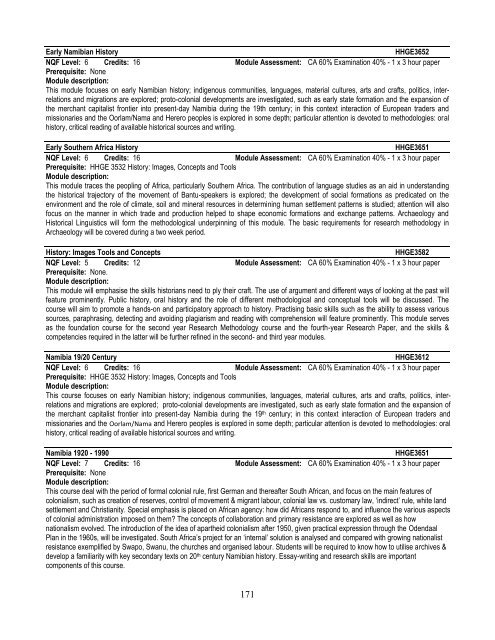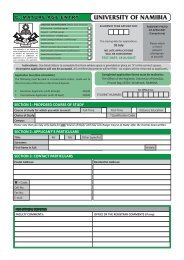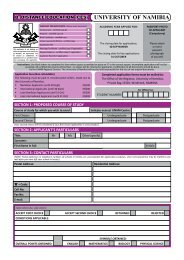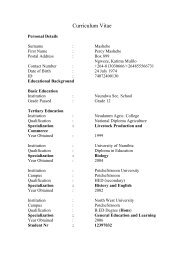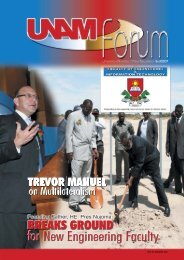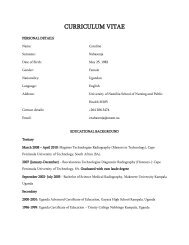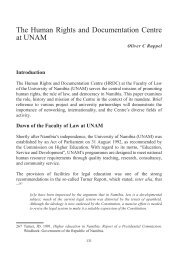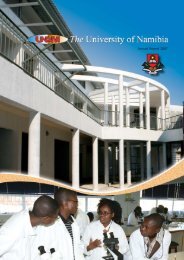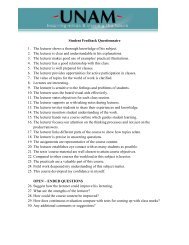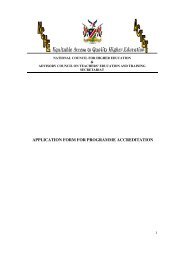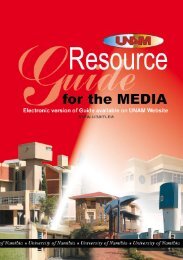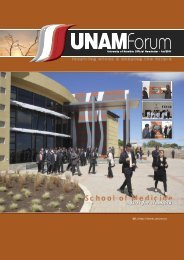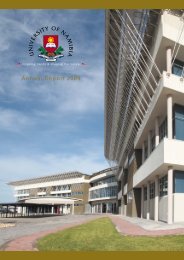UNIVERSITY OF NAMIBIA CENTRE FOR EXTERNAL STUDIES ...
UNIVERSITY OF NAMIBIA CENTRE FOR EXTERNAL STUDIES ...
UNIVERSITY OF NAMIBIA CENTRE FOR EXTERNAL STUDIES ...
You also want an ePaper? Increase the reach of your titles
YUMPU automatically turns print PDFs into web optimized ePapers that Google loves.
Early Namibian HistoryHHGE3652NQF Level: 6 Credits: 16 Module Assessment: CA 60% Examination 40% - 1 x 3 hour paperPrerequisite: NoneModule description:This module focuses on early Namibian history; indigenous communities, languages, material cultures, arts and crafts, politics, interrelationsand migrations are explored; proto-colonial developments are investigated, such as early state formation and the expansion ofthe merchant capitalist frontier into present-day Namibia during the 19th century; in this context interaction of European traders andmissionaries and the Oorlam/Nama and Herero peoples is explored in some depth; particular attention is devoted to methodologies: oralhistory, critical reading of available historical sources and writing.Early Southern Africa HistoryHHGE3651NQF Level: 6 Credits: 16 Module Assessment: CA 60% Examination 40% - 1 x 3 hour paperPrerequisite: HHGE 3532 History: Images, Concepts and ToolsModule description:This module traces the peopling of Africa, particularly Southern Africa. The contribution of language studies as an aid in understandingthe historical trajectory of the movement of Bantu-speakers is explored; the development of social formations as predicated on theenvironment and the role of climate, soil and mineral resources in determining human settlement patterns is studied; attention will alsofocus on the manner in which trade and production helped to shape economic formations and exchange patterns. Archaeology andHistorical Linguistics will form the methodological underpinning of this module. The basic requirements for research methodology inArchaeology will be covered during a two week period.History: Images Tools and ConceptsHHGE3582NQF Level: 5 Credits: 12 Module Assessment: CA 60% Examination 40% - 1 x 3 hour paperPrerequisite: None.Module description:This module will emphasise the skills historians need to ply their craft. The use of argument and different ways of looking at the past willfeature prominently. Public history, oral history and the role of different methodological and conceptual tools will be discussed. Thecourse will aim to promote a hands-on and participatory approach to history. Practising basic skills such as the ability to assess varioussources, paraphrasing, detecting and avoiding plagiarism and reading with comprehension will feature prominently. This module servesas the foundation course for the second year Research Methodology course and the fourth-year Research Paper, and the skills &competencies required in the latter will be further refined in the second- and third year modules.Namibia 19/20 CenturyHHGE3612NQF Level: 6 Credits: 16 Module Assessment: CA 60% Examination 40% - 1 x 3 hour paperPrerequisite: HHGE 3532 History: Images, Concepts and ToolsModule description:This course focuses on early Namibian history; indigenous communities, languages, material cultures, arts and crafts, politics, interrelationsand migrations are explored; proto-colonial developments are investigated, such as early state formation and the expansion ofthe merchant capitalist frontier into present-day Namibia during the 19 th century; in this context interaction of European traders andmissionaries and the Oorlam/Nama and Herero peoples is explored in some depth; particular attention is devoted to methodologies: oralhistory, critical reading of available historical sources and writing.Namibia 1920 - 1990HHGE3651NQF Level: 7 Credits: 16 Module Assessment: CA 60% Examination 40% - 1 x 3 hour paperPrerequisite: NoneModule description:This course deal with the period of formal colonial rule, first German and thereafter South African, and focus on the main features ofcolonialism, such as creation of reserves, control of movement & migrant labour, colonial law vs. customary law, ‘indirect’ rule, white landsettlement and Christianity. Special emphasis is placed on African agency: how did Africans respond to, and influence the various aspectsof colonial administration imposed on them? The concepts of collaboration and primary resistance are explored as well as hownationalism evolved. The introduction of the idea of apartheid colonialism after 1950, given practical expression through the OdendaalPlan in the 1960s, will be investigated. South Africa’s project for an ‘internal’ solution is analysed and compared with growing nationalistresistance exemplified by Swapo, Swanu, the churches and organised labour. Students will be required to know how to utilise archives &develop a familiarity with key secondary texts on 20 th century Namibian history. Essay-writing and research skills are importantcomponents of this course.171


